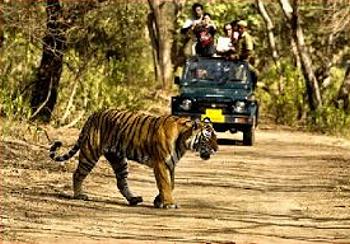
NEW DELHI, India, July 9, 2013 (ENS) – There is evidence that some wildlife crime syndicates are linked to terror groups, India’s Environment Minister Jayanthi Natarajan told a meeting Friday of police, customs and wildlife officers from eight countries.
At the five-day meeting co-convened by Interpol’s Environmental Crime Program and India’s Central Bureau of Investigation, CBI, Natarajan said, “The existence of illegal wildlife trade undermines efforts made by a country to protect their natural resources. Recent evidence points at, as CBI must be knowing, some of the networks are linked with terror groups.”

Opening the meeting, CBI Director Ranjit Sinha described wildlife crime as a highly organized, transnational crime conducted by an extensive network of criminals.
Referring to tigers as the “greatest living symbol of our natural world,” Sinha called for greater coordination between intelligence and law enforcement agencies across international borders.
The Wildlife Crime Control Bureau in India, National Tiger Conservation Authority and TRAFFIC India were partners in the workshop held for law enforcement officials from the eight countries in the South Asia Wildlife Enforcement Network, SAWEN: Afghanistan, Bangladesh, Bhutan, India, Maldives, Nepal, Pakistan and Sri Lanka.
Dr. Maheshwar Dhakal of the Bhutan-based SAWEN Secretariat highlighted the need for capacity building of law enforcement agencies of the eight SAWEN countries through networking and information sharing to combat wildlife crime in the South Asia region.
Dr. Shekhar Kumar Niraj, head of TRAFFIC in India, said, “TRAFFIC is overwhelmed to see that our long-term efforts to support SAWEN are bearing fruit. Through the leadership of India in bringing all the eight nations together, these issues of critical importance for combating illegal wildlife trade and poaching have boosted SAWEN’s potential as a best-practice law enforcement network.”
“A concentrated global response, and empowering the South Asian region to act, is the only way that the menace of illegal wildlife trade can be dealt with,” said Niraj.
Participants focused on National Environmental Security Task Forces; new initiatives in tiger poaching; trends in seizures; tiger genome projects; wildlife forensics, cyber forensics and DNA analysis; investigating wildlife smugglers and effective prosecution of wildlife crimes.
The sessions were addressed by experts in wildlife crime, Interpol and CBI officers, forest officers including the directors of Panna and Jim Corbett National Parks, tiger conservationists, senior lawyers specializing in wildlife crime and forensic experts.
Natarajan pledged her country’s support for the conservation of wild tigers and all Asian big cats.

“In 50 years of conservation, we have not seen wildlife trade at the scale we see today,” she said. “It is the greatest threat to some of our wildlife species like the tiger, elephant and rhinoceros. The battle is far from won.”
The New Delhi meeting was held under the auspices of Interpol’s Project Predator, which supports regional efforts for the conservation of wild tigers and other Asian big cats.
USAID is a strong supporter and funder of Project Predator, and meeting participants took note of President Barack Obama’s executive order of July 1, describing how wildlife crimes are increasingly coordinated by organized criminal groups and establishing a Presidential Task Force on Wildlife Trafficking.
Project Predator Leader Ioana Botezatu said, “The recent wave of proactive initiatives, and the increased focus and determination of regional law enforcement agencies to reverse the criminal trend impacting our environment through multi-disciplinary strategic thinking, are a true success of our generation.”
“Interpol’s resources and secure network enable the wildlife community to be safe in its actions,” Botezatu said. “The Environmental Crime Programme is for this reason recommending countries to provide access to INTERPOL’s I-24/7 network to all law enforcement agencies that could bring value to environmental security.”
“The access will enhance communication in a secure and professional manner, linking and equipping continents, regions, countries and national agencies with the means to fight modern crime,” Botezatu said. “Support from partners such as SAWEN and TRAFFIC is essential for enhancing cohesion between countries in the region to improve wildlife law enforcement.”
The meeting in New Delhi was the first of two integrated training and operational planning meetings in Asia. A Training and Needs Assessment for Investigating Wildlife Operations in Southeast Asia is underway all this week in Bangkok, Thailand.
Raising wildlife crime and other environmental crimes on the political agenda is also an objective of the Interpol Environmental Compliance and Enforcement events to be held in Nairobi, Kenya in November.
Copyright Environment News Service (ENS) 2013. All rights reserved.
© 2013, Environment News Service. All rights reserved. Content may be quoted only with proper attribution and a direct link to the original article. Full reproduction is prohibited.
